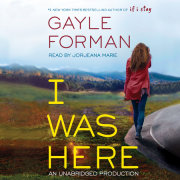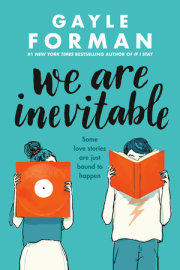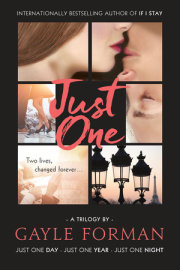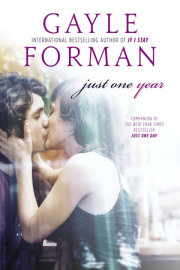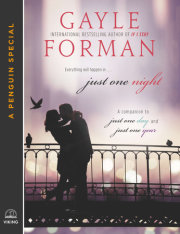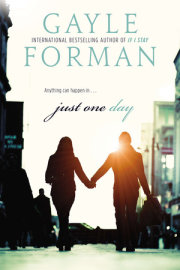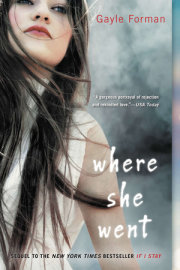Chapter 1 The day after Meg died, I received this letter:
I regret to inform you that I have had to take my own life. This decision has been a long time coming, and was mine alone to make. I know it will cause you pain, and for that I am sorry, but please know that I needed to end my own pain. This has nothing to do with you and everything to do with me. It’s not your fault.
Meg
She emailed copies of the letter to her parents and to me, and to the Tacoma police department, along with another note informing them which motel she was at, which room she was in, what poison she had ingested, and how her body should be safely handled. On the pillow at the motel room was another note—instructing the maid to call the police and not touch her body—along with a fifty-dollar tip.
She sent the emails on a time delay. So that she would be long gone by the time we received them.
Of course, I didn’t know any of that until later. So when I first read Meg’s email on the computer at our town’s public library, I thought it had to be some kind of joke. Or a hoax. So I called Meg, and when she didn’t answer, I called her parents.
“Did you get Meg’s email?” I asked them.
“What email?”
Chapter 2 There are memorial services. And there are vigils. And then there are the prayer circles. It gets hard to keep them straight. At the vigils, you hold candles, but sometimes you do that at the prayer circles. At the memorial services, people talk, though what is there to say?
It was bad enough she had to die. On purpose. But for subjecting me to all of this, I could kill her.
“Cody, are you ready?” Tricia calls.
It is late on a Thursday afternoon, and we are going to the fifth service in the past month. This one is a candlelight vigil. I think.
I emerge from my bedroom. My mother is zipping up the black cocktail dress she picked up from the Goodwill after Meg died. She’s been using it as her funeral dress, but I’m sure that once this blows over, it’ll go into rotation as a going-out dress. She looks hot in it. Like so many people in town, mourning becomes her.
“Why aren’t you dressed?” she asks.
“All my nice clothes are dirty.”
“What nice clothes?”
“Fine, all my vaguely funereal clothes are dirty.”
“Dirty never stopped you before.”
We glare at each other. When I was eight, Tricia announced I was old enough to do my own laundry. I hate doing laundry. You can see where this leads.
“I don’t get why we have to go to another one,” I say.
“Because the town needs to process.”
“Cheese needs to process. The town needs to find another drama to distract itself with.”
There are fifteen hundred and seventy-four people in our town according to the fading sign on the highway. “Fifteen hundred and seventy-three,” Meg said when she escaped to college in Tacoma on a full scholarship last fall. “Fifteen hundred and seventy-two when you come to Seattle and we get our apartment together,” she’d added.
It remains stuck at fifteen hundred and seventy-three now, and I suspect it’ll stay there until someone else is born or dies. Most people don’t leave. Even when Tammy Henthoff and Matt Parner left their respective spouses to run off together—the gossip that was the hottest news before Meg—they moved to an RV park on the edge of town.
“Do I have to go?” I’m not sure why I bother to ask her this. Tricia is my mother but she’s not an authority in that way. I know why I have to go. For Joe and Sue.
They’re Meg’s parents. Or they were. I keep stumbling over the verb tenses. Do you cease being someone’s parent because they died? Because they died on purpose?
Joe and Sue look blasted into heartbreak, the hollows under their eyes so deep I don’t see how they’ll ever go away. And it’s for them I find my least-stinky dress and put it on. I get ready to sing. Again.
Amazing Grace. How Vile the Sound.
Chapter 3 I’ve written a dozen mental eulogies for Meg, imagining all the things I might say about her. Like how when we met in the first week of kindergarten she made me a picture of us, with both our names, and some words I didn’t understand because unlike Meg, I could not yet read or write. “It says ‘best friends,’” she’d explained. And like all things Meg wanted or predicted, it turned out to be true. I might talk about how I still have that picture. I keep it in a metal toolbox that houses all my most important things, and it is creased from age and multiple viewings.
Or I might talk about how Meg knew things about people that they might not know themselves. She knew the precise number of times in a row everyone generally sneezed; there’s a pattern to it, apparently. I was three; Scottie and Sue four, Joe was two, Meg was five. Meg could also remember what you wore for every picture day, every Halloween. She was like the archive of my history. And also the creator of it, too, because almost every one of those Halloweens was spent with her, usually in some costume she dreamed up.
Or I might talk about Meg and her obsession with firefly songs. It started in ninth grade when she’d picked up a vinyl single by a band called Heavens to Betsy. She’d dragged me back to her room and played me the scratchy record on that old turntable she’d bought at a church jumble sale for a dollar and rewired herself, with a little help from YouTube instructional videos. And you will never know how it feels to light up the sky. You will never know how it feels to be a firefly, Corin Tucker sang in a voice so simultaneously strong and vulnerable that it seemed almost inhuman.
After the Heavens to Betsy discovery, Meg went on a mission to find every good firefly song ever written. In true Meg fashion, within a few weeks she’d amassed an exhaustive list. “Have you ever even seen a firefly?” I’d asked her as she worked on her playlist.
I knew she hadn’t. Like me, Meg had never been east of the Rockies. “I have time,” she’d said, opening her arms, as if to demonstrate just how much life there was out there, waiting for her.
#
Joe and Sue asked me to speak at that first service, the big one that should’ve been held in the Catholic church the Garcias had attended for years, but wasn’t because Father Grady, though a friend of the family, was a rules man. He told the Garcias that Meg had committed a cardinal sin and therefore her soul wouldn’t be admitted to heaven, nor her body to the Catholic cemetery.
The last bit was theoretical. It took several weeks after Meg’s death for investigators to release her body. Apparently the poison she’d used was rare, though anyone who knew Meg wouldn’t be surprised by this. She never wore clothes from chain stores, always listened to bands no one else had heard of. Naturally, she found some obscure poison to swallow.
So the casket everyone had sobbed over at that first big service had been empty and there’d been no burial. I’d overheard Meg’s uncle Xavier tell his girlfriend that maybe it would be better if there never was one. No one knew what to write on the gravestone. “Everything sounds like a reproach,” he’d said.
I tried to write a eulogy for that service. I did. I pulled out the disc Meg had burned of firefly songs for inspiration. The third one up was the Bishop Allen track “Fireflies.” I don’t know if I ever really listened to the words before, because when I did now, they were like a smack from her grave: It says you can still forgive her. And she will forgive you back.
But I don’t know that I can. And I don’t know that she did.
I told Joe and Sue that I was sorry, that I couldn’t give a eulogy, that I just couldn’t think of anything to say.
It was the first time I ever lied to them.
#
Today’s service is being held in the Rotary Club, so it’s not one of the official religious services, though the speaker appears to be some kind of reverend. I’m not sure where they keep coming from, all these speakers who didn’t really know Meg. After it’s over, Sue invites me over for yet another reception at the house.
I used to spend so much time at Meg’s house that I could tell what kind of mood Sue was in by what I smelled when I walked through the door. Butter meant baking, which meant she was melancholy and needed cheering. Spicy meant she was happy and making hot Mexican food for Joe, even though it hurt her stomach. Popcorn meant that she was in bed, in the dark, not cooking anything, and Meg and Scottie were left to their own devices, which meant a buffet of microwave snack foods. On those days, Joe would joke how lucky we kids were to get to pig out like this as he made his way upstairs to check on Sue. We all played along, but usually, after the second or third microwave corndog, you kind of wanted to throw up.
I know the Garcias so well that when I called that morning after getting Meg’s email, I knew even though it was eleven o’clock on a Saturday that Sue would be still in bed but not sleeping; she said she never did learn to sleep in once her kids stopped waking up early. And Joe would have the coffee brewed and the morning paper spread out over the kitchen table. Scottie would be watching cartoons. Consistency was one of the many things I loved about Meg’s house. So different from mine where the earliest Tricia usually woke was noon, and some days you might find her pouring bowls of cereal, and some days you might find the house empty, Tricia’s bed untouched since the night before.
But now there’s a different kind of constancy about the Garcia household, one that is far less inviting. Still, when Sue asks me over, much as I’d prefer to refuse the invitation, I don’t.
#
The crowd of cars outside the house is thinner than it was in the early days when the whole town came on sympathy calls carrying Pyrex dishes. It was a little hard to take, all those casseroles and the “I’m so sorry for your losses” that accompanied them. Because elsewhere in town, the gossip was flying. Didn’t surprise me. Girl always hung her freak flag high, I heard people whispering in the Circle K. Meg and I both knew that some people said things like that about her—in our town she was like a rose blooming in the desert; it confused folks—but with her dead, this sentiment no longer felt like a badge of honor.
And it wasn’t just Meg they went after. At the bar where Tricia worked, I overheard a couple of townies sniping about Sue. “As a mother, I would know if my daughter was suicidal.” This coming from the mother of Carrie Tarkington, who had slept with half the school. I was about to ask Mrs. Tarkington if, being all-knowing, she knew that. But then her friend replied. “Sue? Are you joking. That woman is floating in space on a good day,” and I felt sucker punched by their cruelty. “How would you feel if you’d just lost your child, you bitches?” I’d sneered. Tricia had had to escort me home.
After today’s service, Tricia has to go to work so she drops me off at the Garcias’. I let myself in. Joe and Sue hug me tight and for a moment longer than is comfortable. I know that they must take some solace in me being here but I can hear Sue’s silent questions when she looks at me, and I know that all the questions boil down to one: Did you know?
I don’t know what would be worse. If I did know and didn’t tell them, or the truth, which is that even though Meg was my best friend and I have told her everything there is to tell about me and I assumed she’d done the same, I had no idea. Not a clue.
This decision has been a long time coming, she wrote in her note. A long time coming? How long is that? Weeks? Months? Years? I have known Meg since kindergarten. We have been best friends, sisters almost, ever since. How long has this decision been coming without her telling me? And more to the point, why didn’t she tell me?
Copyright © 2015 by Gayle Forman. All rights reserved. No part of this excerpt may be reproduced or reprinted without permission in writing from the publisher.




